Why Your Content Creation Toolkit Needs a 2025 Upgrade
Producing high-quality content consistently is essential for standing out. The right software can be the difference between a struggling creator and a thriving brand, but the market is flooded with options. The landscape of content creation software is constantly evolving, with powerful AI solutions and specialized platforms emerging daily. Staying competitive means equipping yourself with a modern toolkit that streamlines your workflow, boosts creativity, and maximizes impact across all your channels.
This guide is designed to cut through the noise. We have curated a definitive list of the best tools for content creation to help you build the perfect tech stack. We will move beyond generic feature lists to provide a detailed analysis, practical use cases, and honest assessments of each platform's strengths and limitations. You will learn how to select and implement tools that solve specific problems, whether you need to manage a complex content calendar, design stunning visuals, edit professional videos, or optimize your articles for search engines. This resource will help you make informed decisions to elevate your entire content strategy.
1. ai-media-studio
AI Media Studio solidifies its spot as one of the best tools for content creation by offering a remarkably accessible entry point into AI-powered visual generation. It’s an ideal solution for marketers, small business owners, and solo creators who need professional-grade images and videos without the steep learning curve or high costs associated with traditional design software. Its core strength lies in its simplicity; you can generate high-quality visuals from simple text prompts, making it perfect for creating social media posts, blog headers, or ad creatives in minutes.
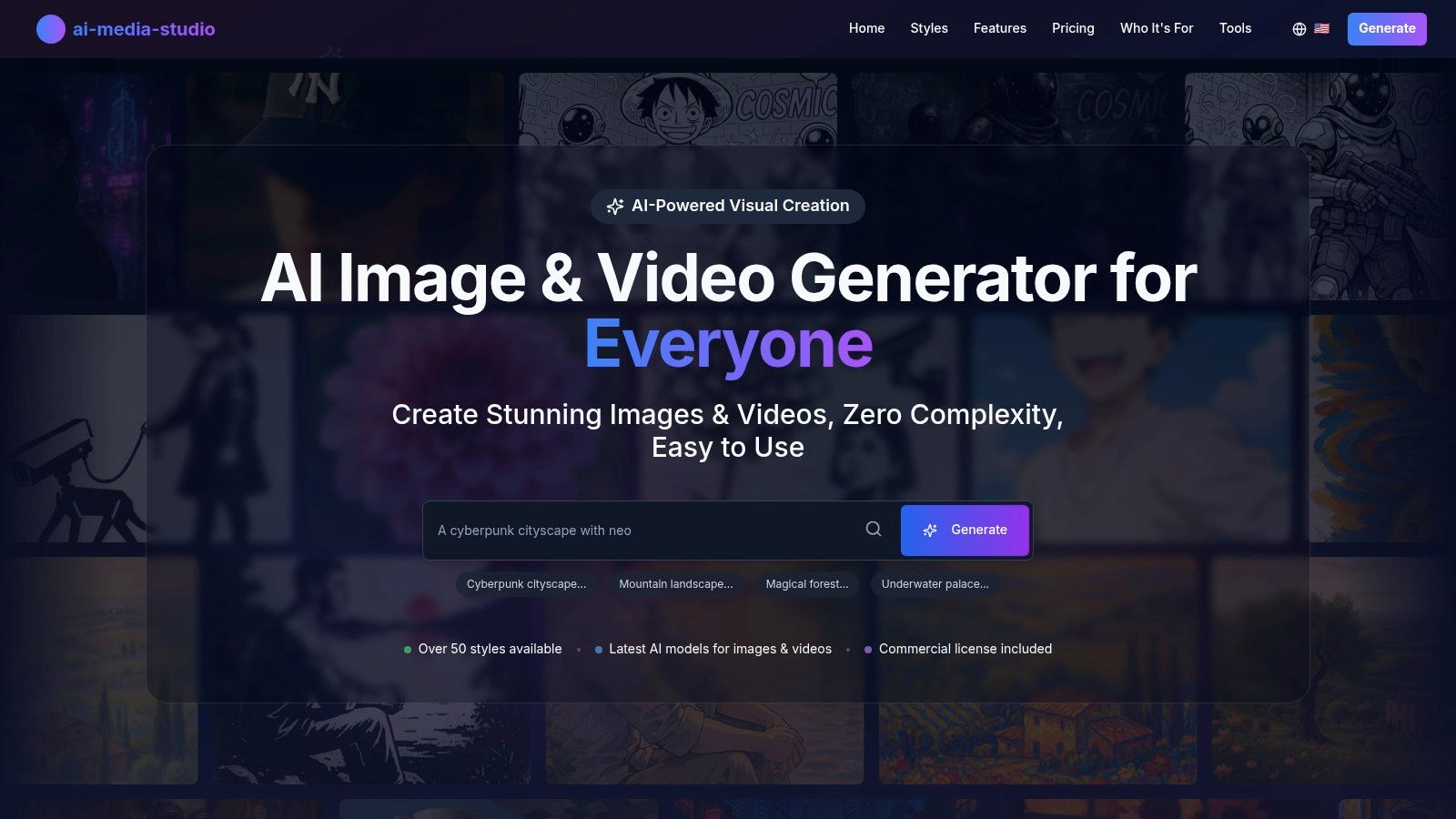
The platform’s library of over 50 art styles, from photorealistic to anime, provides significant creative flexibility. For instance, a marketing team can quickly produce a series of cyberpunk-themed visuals for a tech product launch, while an educator can generate watercolor-style illustrations for a presentation. This versatility removes the bottleneck of relying on a dedicated designer for every visual asset.
Key Features & Use Cases
- Diverse Art Styles: With 50+ styles, you can maintain a consistent aesthetic for a campaign or experiment with different looks for A/B testing ad creatives.
- Ease of Use: No technical skill is needed. Simply describe the image you want. This is ideal for social media managers who need to produce content at a high velocity.
- Team Collaboration: Shared workspaces make it easy for agencies and marketing teams to collaborate on visual projects, review generations, and maintain brand consistency.
- Commercial Use Rights: Paid plans include full commercial licenses, a critical feature for businesses using AI visuals in marketing materials or products.
Pros & Cons
| Pros | Cons |
|---|---|
| Highly Accessible: Free tier and affordable plans lower the barrier to entry for AI image generation. | Tier-Gated Features: Advanced tools like batch generation are restricted to higher-priced plans. |
| Creative Versatility: Over 50 distinct art styles cater to a wide range of brand aesthetics. | Refinement Needed: Generated images may sometimes require manual fine-tuning for very specific needs. |
| User Privacy: Strong commitment to keeping user data and prompts confidential. |
Pricing
AI Media Studio offers a free plan with 3 image generations per month. Paid subscriptions are available in tiered structures, providing more credits, higher resolution outputs, advanced editing, and team features.
Website: ai-media-studio.com
2. Canva
Canva has established itself as an indispensable tool for content creation by democratizing design for users of all skill levels. It's the go-to platform for marketers, educators, and small business owners who need to produce high-quality visual content quickly and efficiently. The core of its appeal is the intuitive drag-and-drop editor paired with a massive library of templates, which removes the technical barriers associated with professional design software like Adobe Photoshop. You can craft everything from engaging social media graphics to detailed presentations and video ads in a fraction of the time.
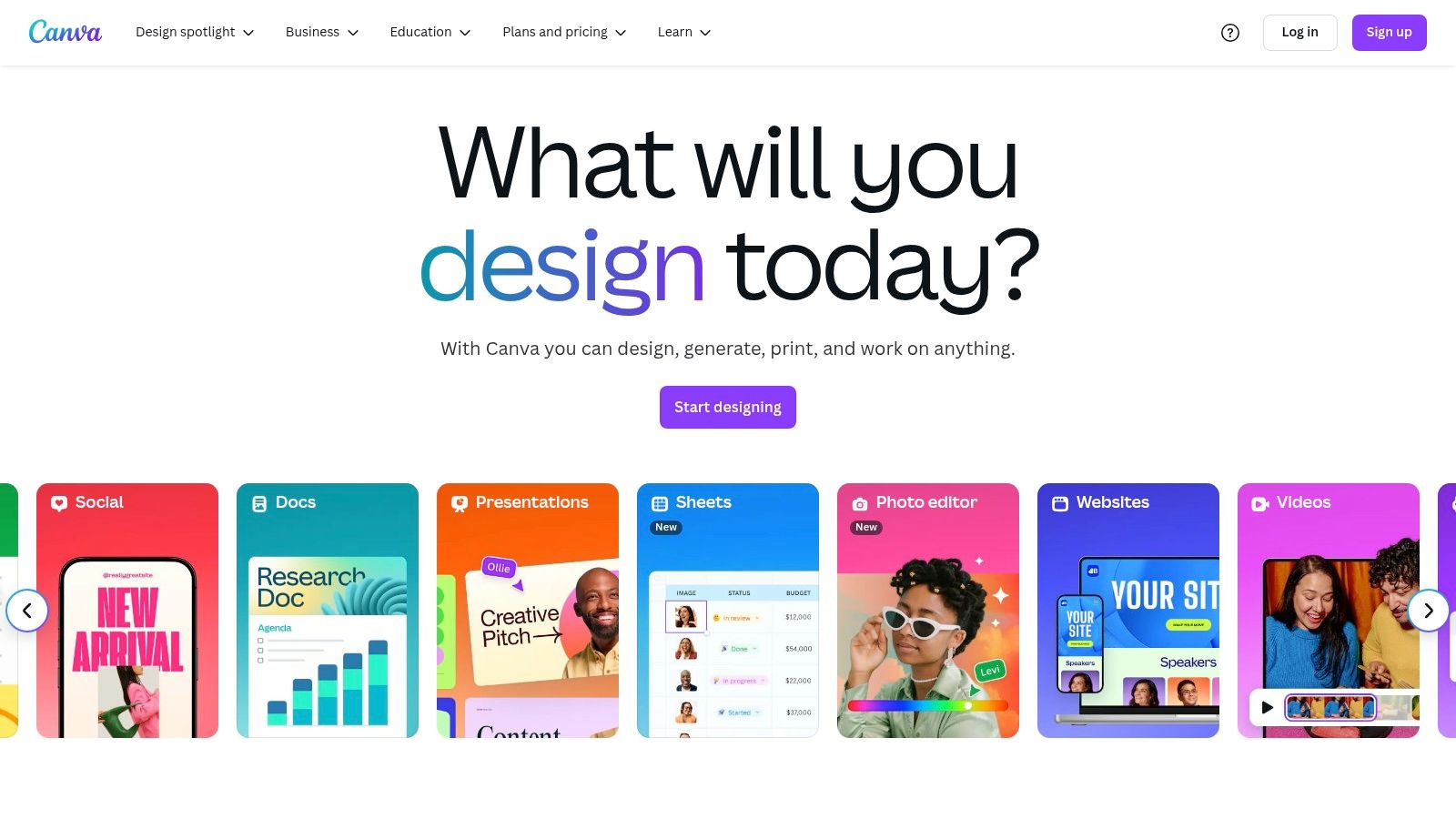
The platform excels at enabling rapid content production without sacrificing quality. For example, a social media manager can use a template to create a week's worth of Instagram posts in under an hour, while a startup can develop a cohesive set of branding materials using the Brand Kit feature. This functionality streamlines workflows and ensures brand consistency across all marketing channels. For those specifically looking to improve their social presence, you can learn more about making social media graphics to leverage Canva's full potential.
Key Features & Use Cases
- Extensive Template Library: Access thousands of customizable templates for social media, presentations, and print. This is perfect for non-designers needing a professional starting point.
- Drag-and-Drop Editor: The simple interface allows users to easily add, remove, and edit elements, making design accessible to everyone.
- Brand Kit: Businesses can upload logos, color palettes, and fonts to maintain a consistent brand identity across all created assets.
- Collaboration Tools: Teams can work on designs simultaneously, leave comments, and share projects, which is ideal for marketing departments and agencies.
Pros & Cons
| Pros | Cons |
|---|---|
| User-friendly Interface: Extremely easy to learn and use, making it suitable for all skill levels. | Limited Advanced Features: Lacks the sophisticated tools found in professional software like Photoshop or Illustrator. |
| Robust Free Version: The free plan offers significant value with access to many templates and features. | Subscription for Premium Assets: The best templates and elements are often restricted to paid subscribers. |
| Versatile Content Creation: Supports a wide array of formats from static images to videos and websites. |
Pricing
Canva offers a comprehensive free plan that is sufficient for many users. Paid plans (Canva Pro and Canva for Teams) unlock premium features like the Brand Kit, unlimited access to stock content, background remover, and more advanced collaboration tools.
Website: https://www.canva.com/
3. Adobe Premiere Pro
Adobe Premiere Pro stands as the undisputed industry standard for professional video editing, earning its place among the best tools for content creation through its sheer power and versatility. It is the go-to software for filmmakers, YouTubers, and marketing agencies who require a robust, non-linear editor capable of handling complex projects. Its strength lies in its comprehensive toolset that covers everything from initial assembly and fine-tuning edits to advanced color grading and audio mixing, all within a single, integrated environment.
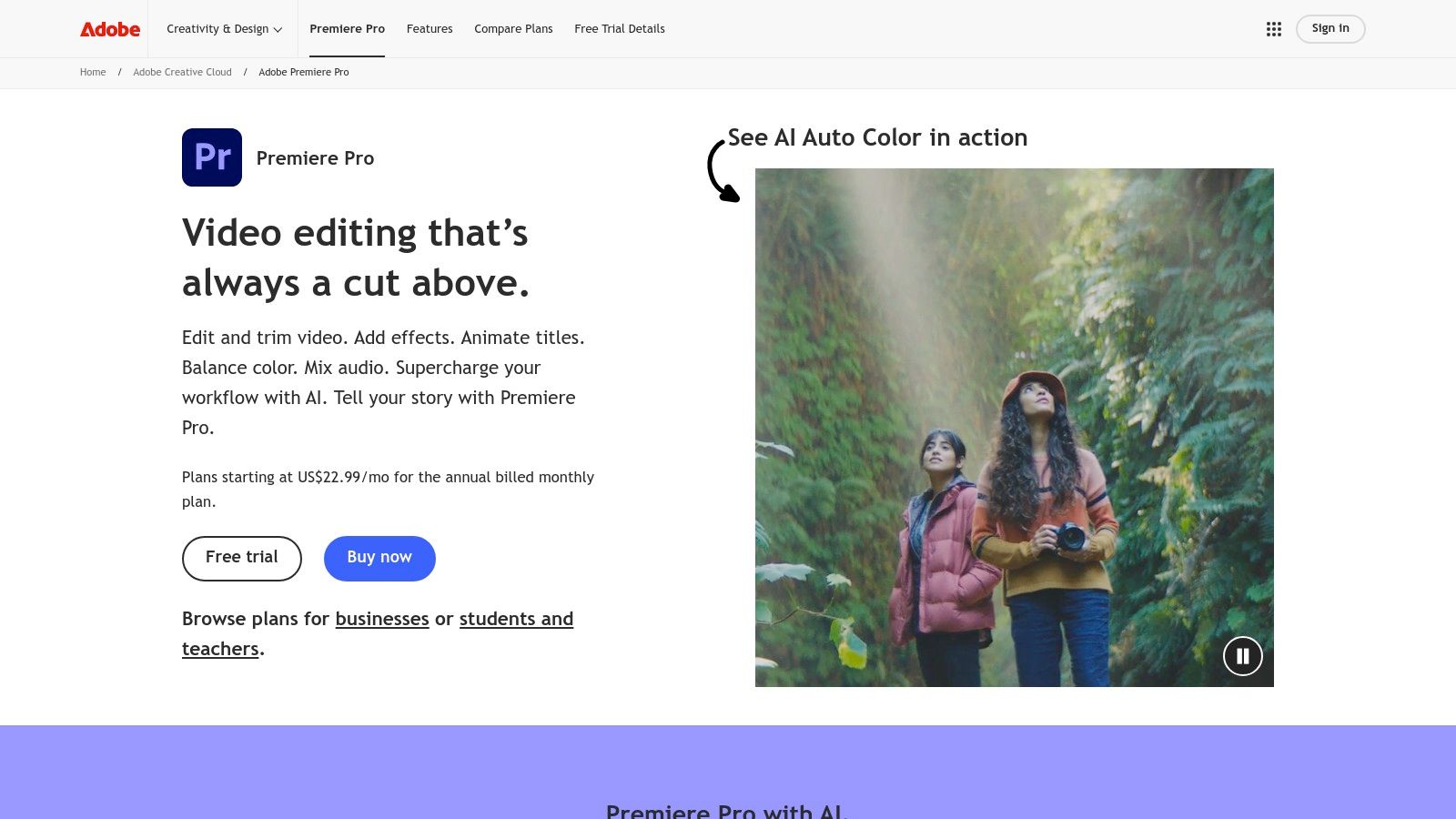
The platform excels in managing high-resolution footage, including 4K, 8K, and VR formats, making it ideal for high-end productions. The seamless integration with other Adobe Creative Cloud apps, like After Effects for motion graphics and Audition for audio post-production, creates an unparalleled workflow. For example, a content creator can easily send a clip to After Effects to add complex visual effects and see the changes reflected in their Premiere Pro timeline instantly.
Key Features & Use Cases
- Advanced Timeline Editing: Utilize AI-powered tools like Scene Edit Detection to automatically add cuts to rendered clips, saving hours of manual work for documentary editors.
- Comprehensive Color Correction: The Lumetri Color panel provides precise controls for color grading, allowing creators to establish a specific mood for a travel vlog or maintain strict brand color consistency in corporate videos.
- Adobe Creative Cloud Integration: Dynamically link projects with After Effects, Photoshop, and Audition, streamlining the workflow for marketing teams creating sophisticated ad campaigns.
- Broad Format Support: Native support for a vast range of video formats ensures creators can work with footage from virtually any camera without tedious transcoding.
Pros & Cons
| Pros | Cons |
|---|---|
| Industry-Standard Tool: Its professional-grade features make it a powerful choice for any video project. | Steeper Learning Curve: Beginners may find the extensive interface and features overwhelming at first. |
| Regular Updates: Adobe consistently adds new features and performance improvements. | Subscription-Based Pricing: The recurring cost can be a significant expense for hobbyists or small creators. |
| Extensive Resources: A massive online community provides endless tutorials and support. |
Pricing
Adobe Premiere Pro is available through an Adobe Creative Cloud subscription. Users can subscribe to Premiere Pro as a single app or as part of the complete Creative Cloud suite, which includes over 20 other applications.
Website: https://www.adobe.com/products/premiere.html
4. Grammarly
Grammarly earns its place as one of the best tools for content creation by acting as an indispensable AI-powered writing partner. It goes beyond a simple spell check to refine clarity, tone, and style, ensuring every piece of written content is polished and professional. For content marketers, bloggers, and social media managers, it’s a safety net that catches embarrassing typos and grammatical errors before publication. Its true value lies in its real-time feedback, which actively helps creators improve their writing skills over time.
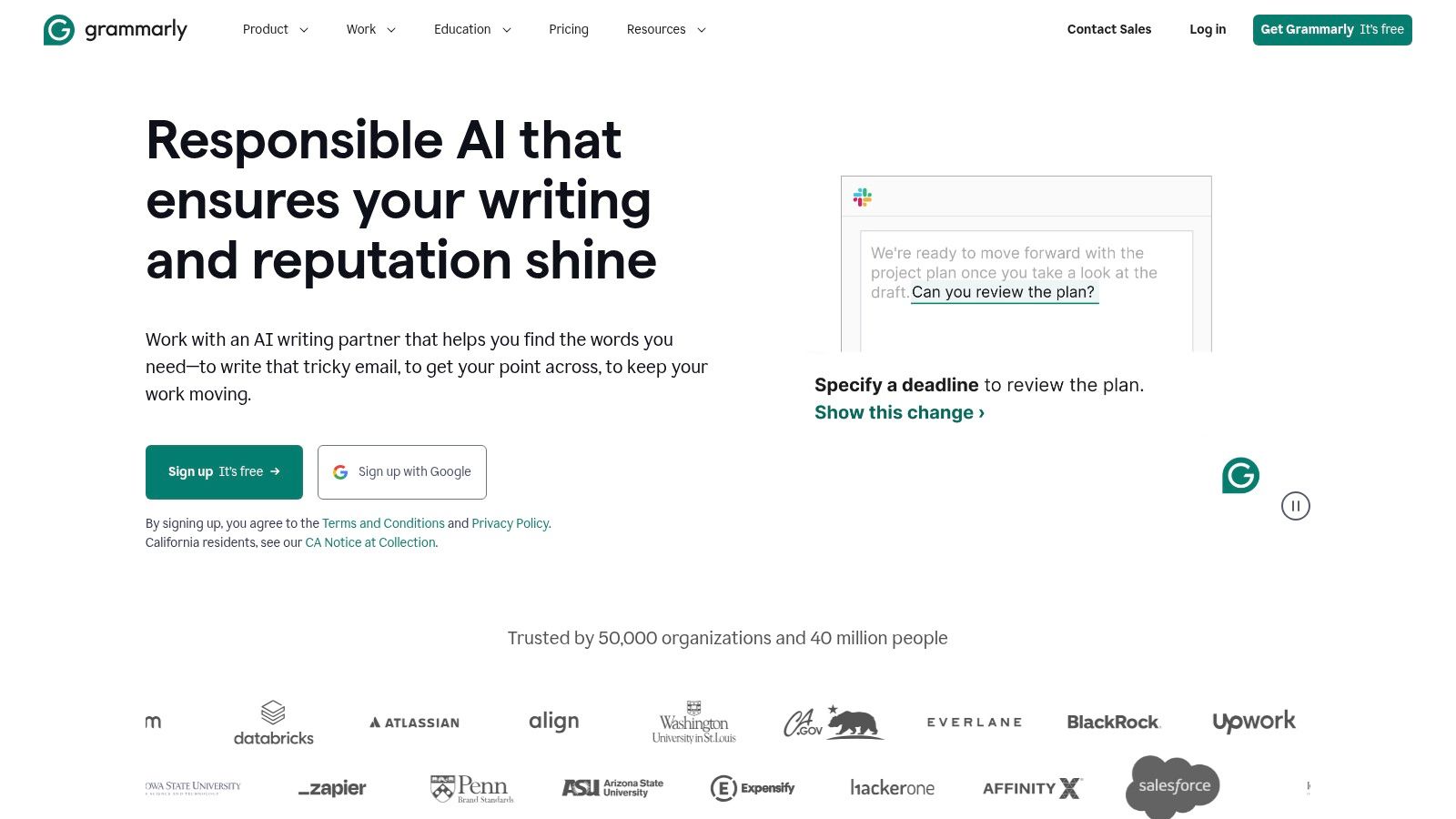
The tool seamlessly integrates into existing workflows, whether you're drafting a blog post in Google Docs, writing an email in Outlook, or crafting a social media update directly on a platform. For instance, a marketing team can use the tone detector to ensure a promotional email sounds confident and persuasive, not demanding. Meanwhile, a freelance writer can use the plagiarism checker to verify the originality of their work before submitting it to a client.
Key Features & Use Cases
- Grammar and Spell Check: Provides essential, real-time corrections to avoid common errors in blog posts, articles, and high-stakes client communications.
- Style and Tone Suggestions: Helps writers adjust their tone to be more confident, friendly, or formal, which is ideal for aligning content with specific brand voice guidelines.
- Plagiarism Detection: A critical premium feature for academic writers, SEO specialists, and content agencies to ensure all published work is original.
- Broad Integration: Browser extensions and app integrations mean you can use it across nearly every platform where you write, from WordPress to LinkedIn.
Pros & Cons
| Pros | Cons |
|---|---|
| User-friendly: Real-time feedback and suggestions are easy to follow. | Premium-Gated Features: Crucial tools like the plagiarism checker are behind a paywall. |
| Platform Versatility: Supports browsers, desktop apps, and mobile. | Contextual Nuances: May occasionally miss complex contextual errors or offer awkward suggestions. |
| Improves Writing Quality: Helps elevate clarity, conciseness, and engagement. |
Pricing
Grammarly offers a robust free version that covers basic grammar, spelling, and punctuation. Premium and Business plans unlock advanced features like plagiarism detection, tone adjustments, full-sentence rewrites, and team-based style guides.
Website: https://www.grammarly.com/
5. Hootsuite
Hootsuite earns its place among the best tools for content creation by centralizing the entire social media management workflow. It’s an indispensable asset for marketing teams, social media managers, and businesses needing to maintain a consistent and strategic presence across multiple platforms. Instead of juggling various social networks, Hootsuite allows you to schedule, publish, monitor, and analyze all your content from one unified dashboard. This streamlines operations, saving significant time and preventing content gaps in your schedule.
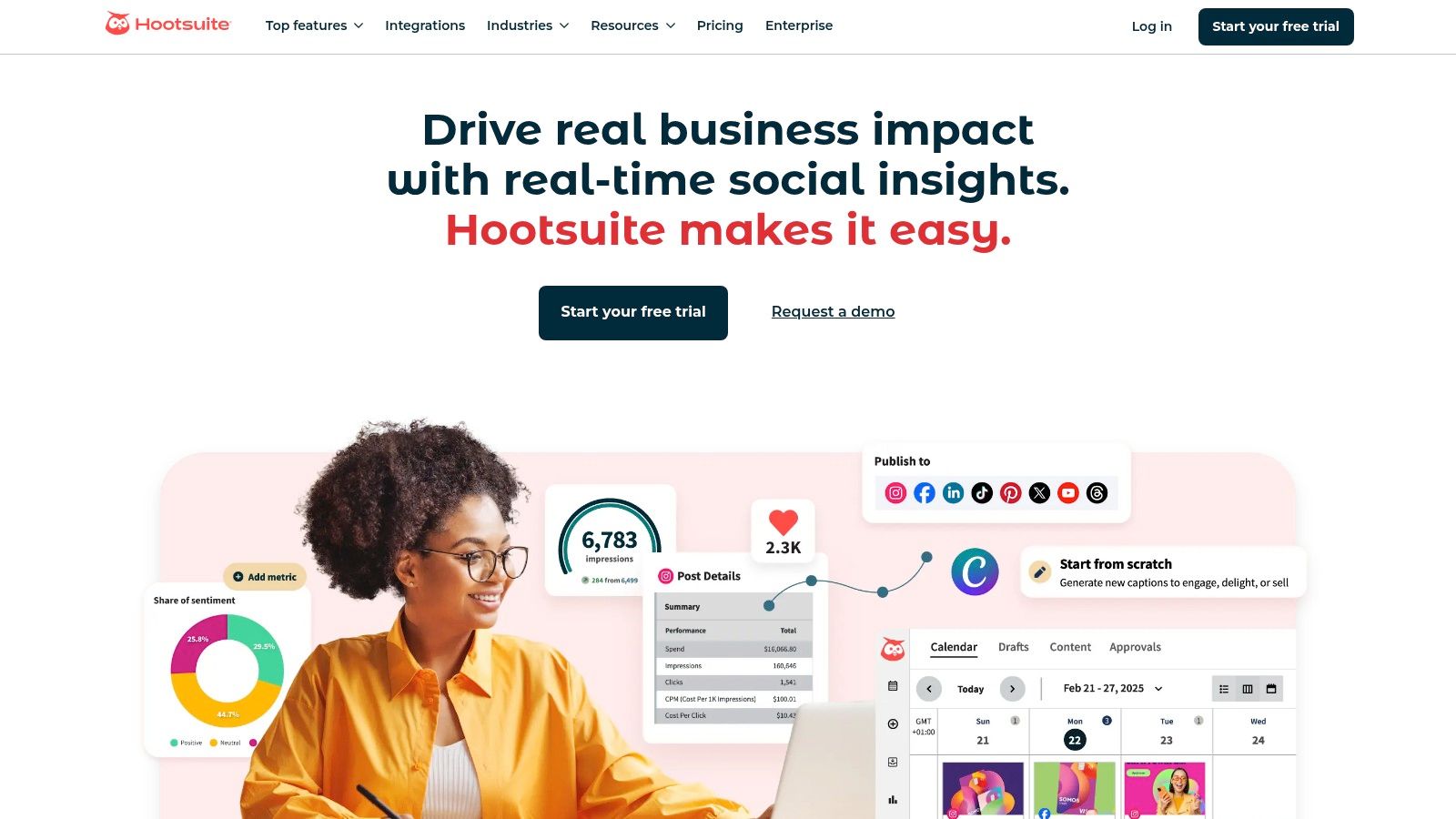
The platform's real power lies in its ability to move beyond simple scheduling. Teams can set up custom streams to monitor specific keywords, hashtags, and brand mentions, turning the tool into a powerful social listening device. For instance, a brand can track competitor activity and customer feedback in real-time, allowing for swift responses and informed strategy adjustments. This combination of publishing and analytics provides a holistic view of your content's performance and audience engagement.
Key Features & Use Cases
- Social Media Scheduling: Plan and bulk-schedule posts across platforms like Instagram, Facebook, X (formerly Twitter), and LinkedIn. This is ideal for executing cohesive marketing campaigns.
- Social Listening and Monitoring: Create custom streams to track mentions, keywords, and conversations relevant to your brand, enabling proactive community management and market research.
- Analytics and Reporting: Generate comprehensive reports to measure content performance, track follower growth, and demonstrate ROI to stakeholders.
- Team Collaboration: Assign tasks, manage post approvals, and control permissions, which is critical for agencies and larger marketing departments to maintain brand voice and quality.
Pros & Cons
| Pros | Cons |
|---|---|
| Supports Multiple Social Platforms: Manages all major networks from a single interface. | Expensive for Smaller Teams: Higher-tier plans can be a significant investment for small businesses. |
| Comprehensive Analytics: Provides in-depth reporting features for data-driven decisions. | Learning Curve: New users may find the extensive feature set and interface initially overwhelming. |
| Facilitates Team Collaboration: Excellent workflow and approval tools for teams. |
Pricing
Hootsuite offers several tiered plans, including Professional and Team options, designed for different business sizes. Pricing is subscription-based, with costs varying based on the number of users and social accounts. A limited free plan and a 30-day trial for paid plans are often available.
Website: https://www.hootsuite.com/
6. Notion
Notion earns its place as one of the best tools for content creation by serving as a powerful, all-in-one workspace for planning, organizing, and executing content strategy. It goes beyond simple note-taking, allowing creators and teams to build customized databases, calendars, and project boards. Its strength is its sheer flexibility; a solo blogger can use it to build a content pipeline, while a marketing team can manage a complex, multi-platform campaign from a single, collaborative hub.
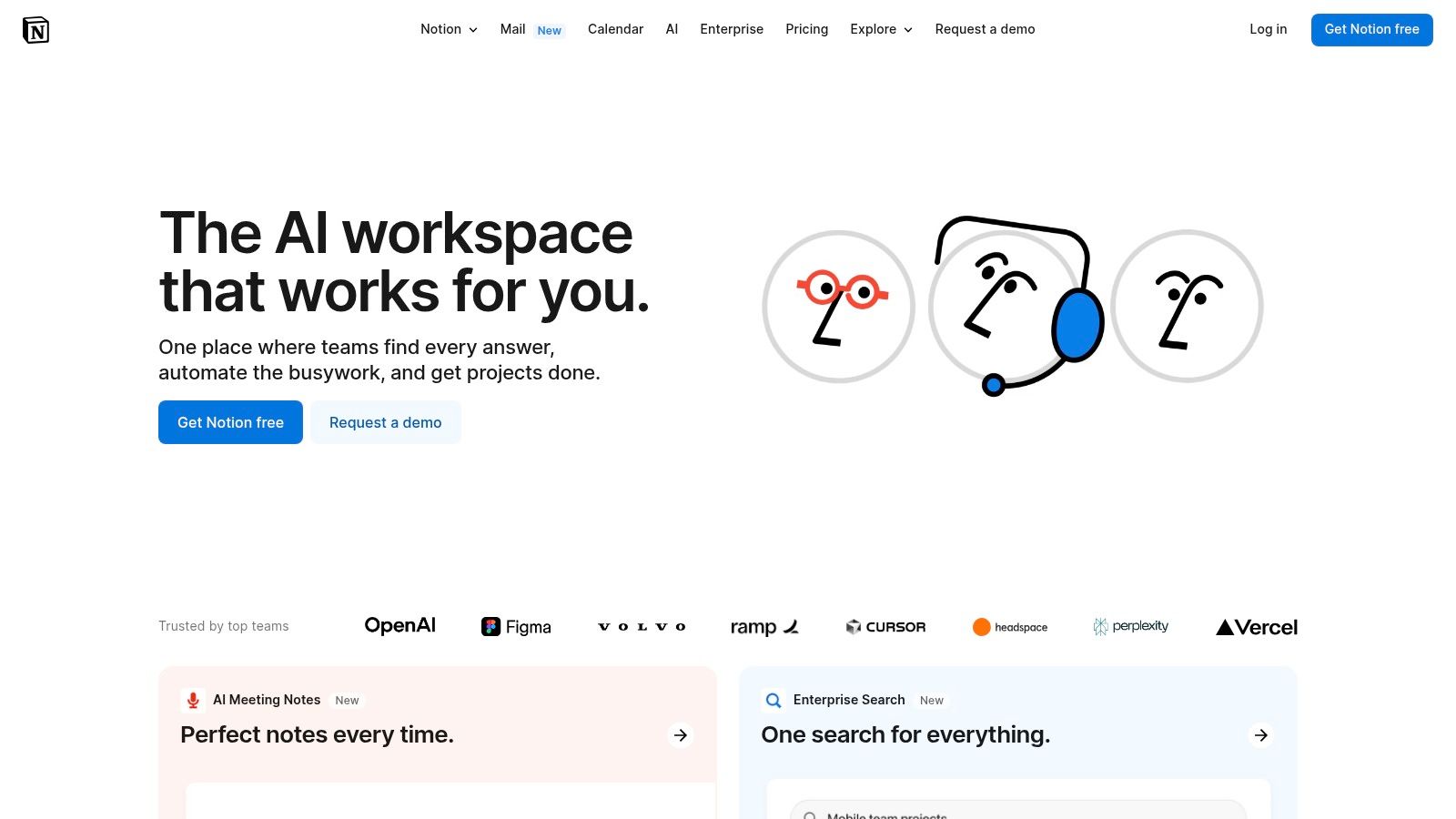
This adaptability makes it invaluable for structured content workflows. For example, you can create a database of blog post ideas, track each article's status from "Draft" to "Published," and link research, outlines, and final drafts all in one place. Its collaborative features ensure everyone on the team has visibility into the content calendar and can contribute in real-time. For a deeper dive into organizing your creative process, you can learn more about effective content workflow management.
Key Features & Use Cases
- Customizable Databases: Create content calendars, editorial pipelines, or asset libraries using tables, boards, and galleries to track every piece of content.
- Rich Media Embedding: Embed anything from YouTube videos and Figma designs to Google Docs directly into a page, centralizing all project resources.
- Real-time Collaboration: Tag team members, leave comments, and edit documents simultaneously, making it ideal for remote content teams.
- Templates for Content: Start quickly with pre-built templates for blog posts, social media calendars, and meeting notes, which you can then customize.
Pros & Cons
| Pros | Cons |
|---|---|
| Highly Flexible: Adapts to nearly any content workflow, from simple task lists to complex project plans. | Overwhelming for Newcomers: The "blank canvas" approach can have a steep learning curve initially. |
| Generous Free Tier: The free plan is robust enough for many individual creators and small teams. | Mobile App Limitations: The mobile experience isn't as seamless or powerful as the desktop version. |
| Excellent for Collaboration: Centralizes communication and assets for entire teams. |
Pricing
Notion offers a comprehensive free plan for individuals. Paid plans (Plus, Business, Enterprise) unlock more advanced features like unlimited file uploads, extended page history, and enhanced security settings for larger teams and organizations.
Website: notion.so
7. Lumen5
Lumen5 has earned its reputation as one of the best tools for content creation by making video production incredibly efficient, especially for content repurposing. It’s a powerful solution for marketers and bloggers who want to transform existing text-based content, like articles or white papers, into dynamic social videos. The platform’s core value lies in its AI-powered workflow; it can analyze a blog post, pull out key sentences, and automatically suggest relevant visuals from its extensive media library. This significantly reduces the time and effort needed to enter the video marketing space.
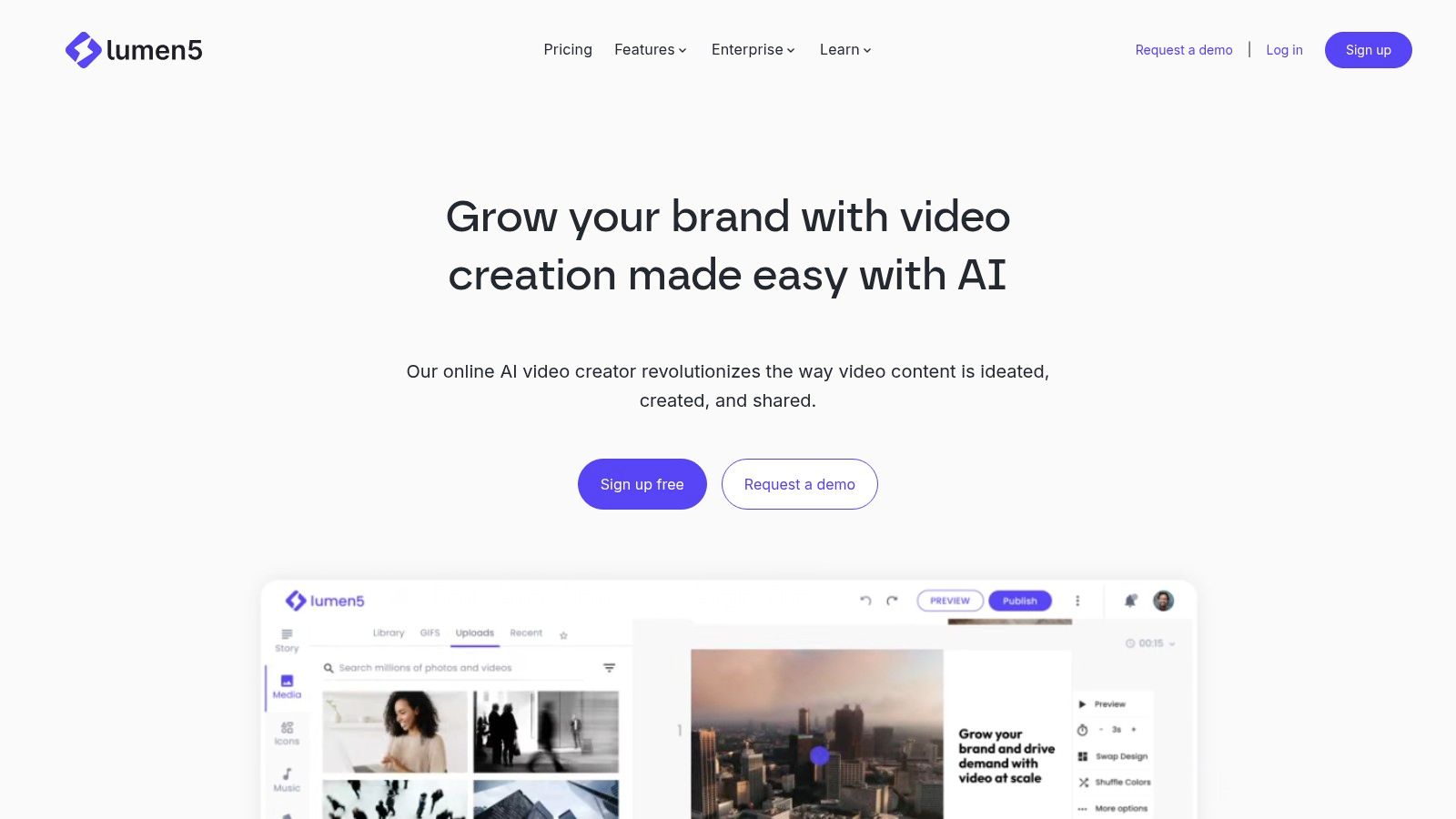
The drag-and-drop interface and customizable templates allow users without video editing experience to produce professional-looking content. For example, a marketing team can quickly convert a new case study into a series of short, shareable videos for LinkedIn and Twitter, extending the reach of their original content. Its focus on turning text into video makes it a uniquely valuable asset for any content strategy aiming for maximum channel coverage.
Key Features & Use Cases
- AI-Driven Text-to-Video: Automatically summarizes articles and blog posts to create a video storyboard. This is perfect for content managers looking to quickly repurpose written content for video-first platforms.
- Extensive Media Library: Gain access to millions of stock photos, video clips, and audio tracks to enrich your video content without sourcing assets externally.
- Customizable Branding: Upload your own logos, watermarks, and fonts to maintain brand consistency across all video outputs, which is crucial for business marketing.
- Multiple Video Formats: Easily create videos in landscape, square, or vertical formats to optimize for different social media platforms like YouTube, Instagram, and TikTok.
Pros & Cons
| Pros | Cons |
|---|---|
| Saves Significant Time: Automates the most time-consuming parts of video creation, from storyboarding to media selection. | Limited Customization: The free and basic tiers offer limited control over scene timing and advanced animations. |
| No Video Experience Needed: Its intuitive interface makes it accessible for marketers and writers, not just video editors. | AI Can Be Literal: The AI's media suggestions sometimes miss context and require manual replacement for accuracy. |
| Excellent for Repurposing: Unlocks the value of existing blog content by turning it into a new, engaging format. |
Pricing
Lumen5 provides a free Community plan that allows for creating up to 5 videos per month with a Lumen5 watermark. Paid plans start with the Basic tier and scale up, offering higher resolution, no branding, and access to a much larger media library.
Website: lumen5.com
8. CapCut
CapCut has rapidly become one of the best tools for content creation, especially for short-form video, by offering a powerful, mobile-first editing suite completely free of charge. Developed by ByteDance, it provides an intuitive interface that empowers both beginners and seasoned creators to produce high-quality, engaging videos for platforms like TikTok, Instagram Reels, and YouTube Shorts. Its strength is its accessibility; it packs advanced features like keyframing, auto-captions, and chroma key into an easy-to-navigate app, removing the financial and technical barriers of traditional video editing software.
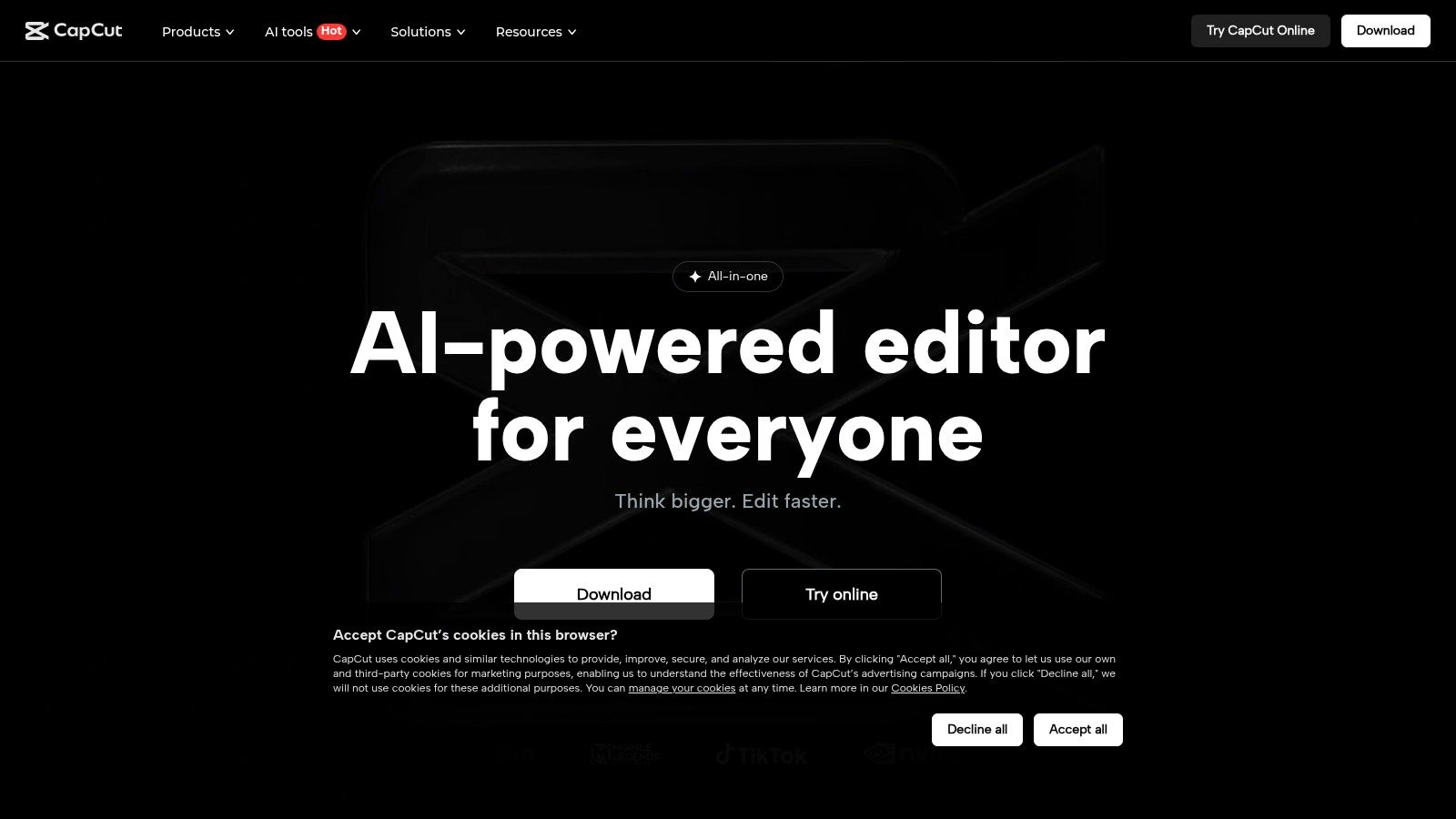
The platform’s seamless integration with TikTok is a significant advantage, allowing creators to quickly export and share their work. Its extensive library of trending sounds, effects, and filters is constantly updated, enabling users to stay current with viral trends. For social media managers and influencers, this means less time sourcing assets and more time creating content that resonates with their audience.
Key Features & Use Cases
- Auto-Captioning and Text-to-Speech: Automatically generate and style subtitles for your videos, improving accessibility and engagement. This is critical for creators whose audiences watch content without sound.
- Extensive Effects Library: Access a vast collection of filters, transitions, and special effects to create visually dynamic content without needing third-party plugins.
- Seamless TikTok Integration: Direct export functionality streamlines the workflow for TikTok creators, making it simple to post polished videos quickly.
- High-Resolution Export: Supports exports up to 4K, ensuring your content looks professional on any device, from mobile phones to large screens.
Pros & Cons
| Pros | Cons |
|---|---|
| Completely Free: No subscription fees or watermarks, making it highly accessible for everyone. | Mobile-First Focus: While a desktop version exists, the app is optimized for mobile and can feel limited on a computer. |
| User-Friendly Interface: Intuitive design makes it easy for beginners to start editing immediately. | Performance on Older Devices: The app can be resource-intensive and may lag or crash on older smartphones. |
| Regular Updates: Constantly adds new, trend-relevant features, effects, and sounds. |
Pricing
CapCut is completely free to use. All features, including high-resolution exports and the removal of the default watermark, are available without a subscription.
Website: https://www.capcut.com/
9. Surfer SEO
Surfer SEO secures its place among the best tools for content creation by transforming SEO from a guessing game into a data-driven science. It’s an essential asset for content writers, marketers, and agencies focused on ranking high in search engine results. Its primary strength is its ability to analyze top-ranking pages for a target keyword and provide a clear, actionable roadmap for creating content that outperforms them. Instead of simply writing what you think will rank, Surfer tells you exactly what Google wants to see.
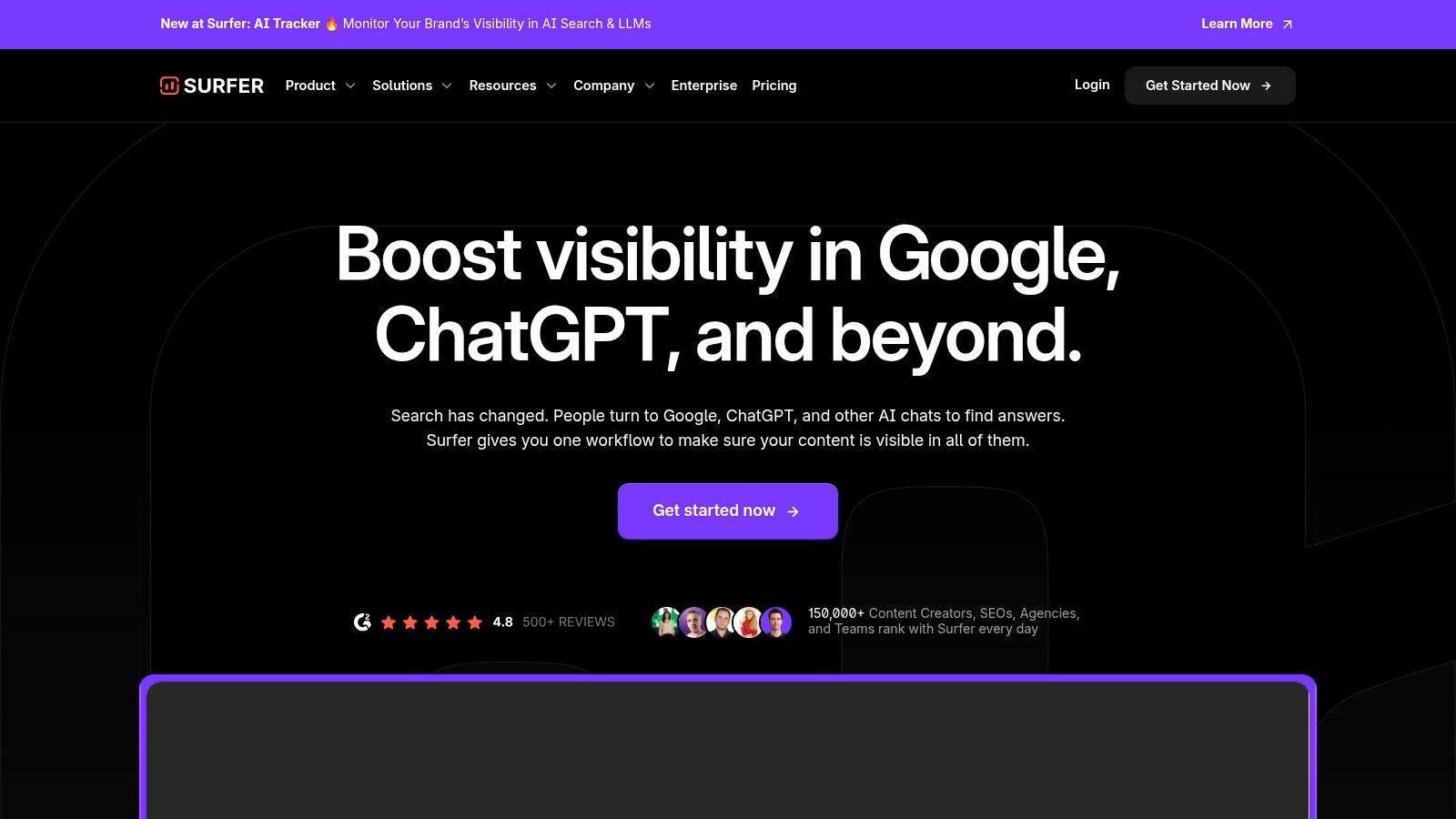
The platform’s real-time Content Editor is its standout feature. As you write, it provides a live "Content Score," guiding you on everything from word count and heading structure to the specific terms and phrases you need to include. This live feedback loop streamlines the optimization process, making it possible for a writer to draft an SEO-optimized article from scratch far more efficiently than with manual analysis. For more details on integrating such tools into your workflow, you can learn more about effective marketing content creation strategies.
Key Features & Use Cases
- Content Editor: Get real-time feedback on your writing to ensure it meets SEO best practices. Ideal for content teams aiming to standardize on-page SEO quality.
- SERP Analyzer: Deep dive into the top 50 search results for any keyword to understand what’s working for your competitors, from content structure to common backlinks.
- Keyword Research: Discover related keywords and analyze search intent, helping you build topic clusters and plan a comprehensive content strategy.
- Audit Tool: Optimize existing pages by running an audit that compares your content against current top competitors and provides specific, actionable improvement suggestions.
Pros & Cons
| Pros | Cons |
|---|---|
| Data-Driven, Actionable Insights: Provides clear, quantifiable recommendations instead of vague advice. | Steep Learning Curve: Some advanced features like the SERP Analyzer can be overwhelming for beginners. |
| Excellent Integrations: Works seamlessly with Google Docs, WordPress, and Jasper for a smooth workflow. | Costly for Solo Users: The pricing structure is better suited for agencies and businesses than for individual bloggers. |
| User-Friendly Interface: The Content Editor simplifies the complex process of on-page optimization. |
Pricing
Surfer SEO operates on a subscription model with several tiers. Plans are primarily differentiated by the number of content editor credits, audit credits, and team member seats included per month. There is no free plan, but they occasionally offer trials or money-back guarantees.
Website: https://surferseo.com/
10. Jasper
Jasper has established itself as a cornerstone among the best tools for content creation, specifically for generating high-quality written material at scale. It excels at helping marketing teams, bloggers, and copywriters overcome writer's block and accelerate their output. The platform's main value is its ability to produce coherent, human-like text from simple inputs, transforming a brief outline or a set of keywords into a full-fledged article, social media update, or email campaign. This makes it an indispensable asset for content creators under tight deadlines.
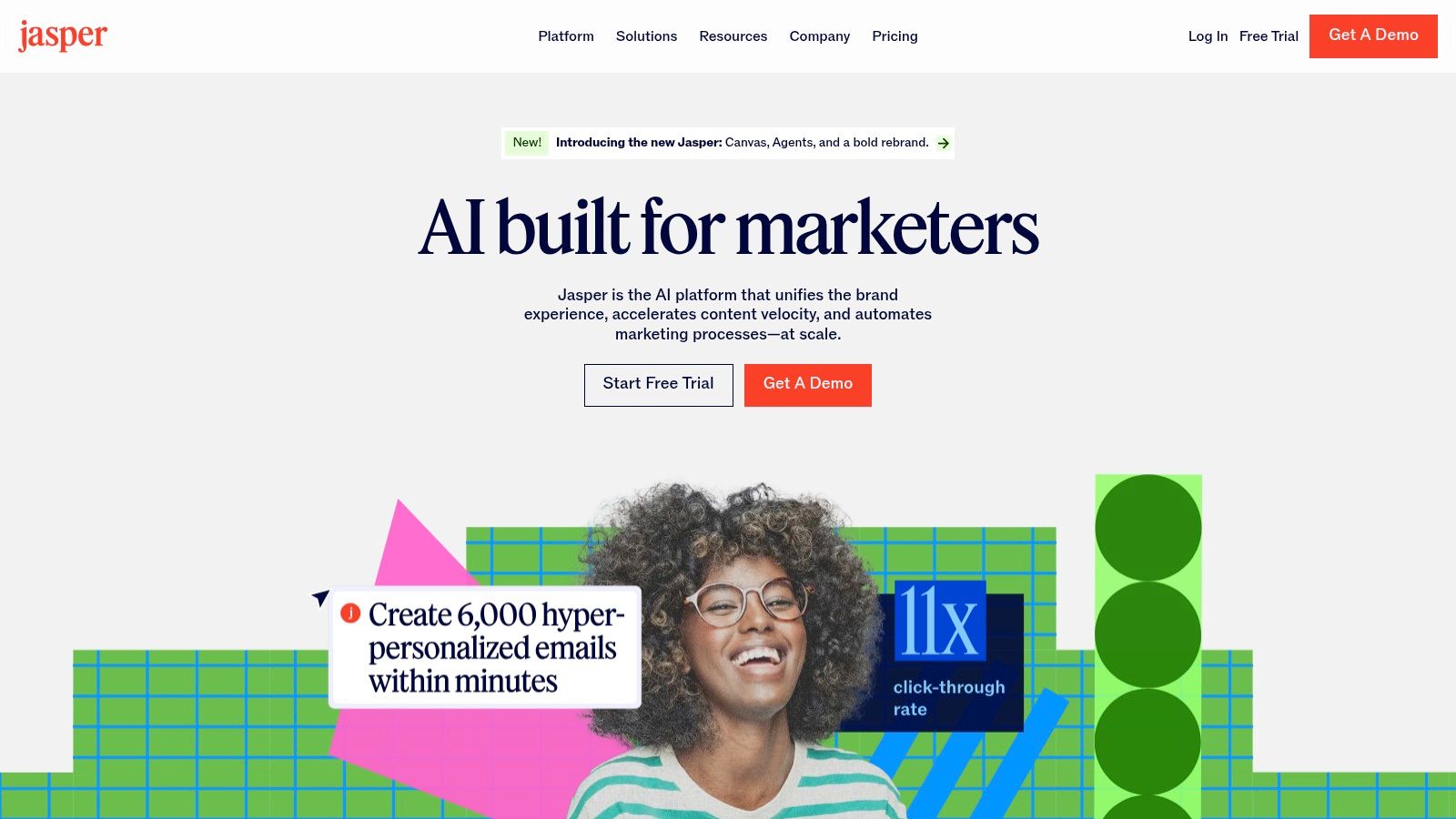
The platform is designed around a system of templates and "recipes," which are pre-built workflows for specific content types like a blog post introduction or a product description. For instance, a marketing team can use the AIDA (Attention, Interest, Desire, Action) framework template to quickly generate compelling ad copy. Similarly, its integration with Surfer SEO allows users to create content that is not only well-written but also optimized for search engine performance directly within the Jasper interface.
Key Features & Use Cases
- AI-Driven Content Generation: Instantly create long-form blog posts, marketing emails, and website copy. This is ideal for scaling content production without hiring more writers.
- Customizable Tone and Style: Instruct the AI to write in a specific voice, such as "witty," "professional," or "empathetic," to maintain brand consistency across all channels.
- Content Templates: Access dozens of pre-built templates for specific tasks like writing video scripts, Google ad headlines, or real estate listings, streamlining the creation process.
- Surfer SEO Integration: Combine Jasper's writing capabilities with Surfer's on-page SEO analysis to craft articles optimized to rank high on search engines.
Pros & Cons
| Pros | Cons |
|---|---|
| Drastically Reduces Writing Time: Accelerates content creation from hours to minutes. | Requires Fact-Checking: The AI can occasionally generate inaccuracies or outdated information. |
| High-Quality, Coherent Text: Produces natural-sounding content that often requires minimal editing. | Costly for Individuals: Subscription plans can be a significant investment for freelancers or small businesses. |
| Versatile and Adaptable: Supports multiple languages and a wide array of content formats. | Tone Needs Fine-Tuning: Human oversight is needed to perfectly match a brand's unique voice. |
Pricing
Jasper operates on a subscription-based model with pricing tiers based on word count, number of users, and access to advanced features like brand voice and campaigns. A free trial is typically available to test its capabilities.
Website: https://www.jasper.ai/
11. Planable
Planable carves out its niche among the best tools for content creation by tackling one of the biggest bottlenecks in social media management: the review and approval process. It is a dedicated collaboration platform where agencies, clients, and internal teams can create, preview, and approve social media posts in a single, streamlined workspace. Its core value lies in its visual-first approach; content is displayed exactly as it will appear on each platform, eliminating confusing mockups in spreadsheets or slide decks.
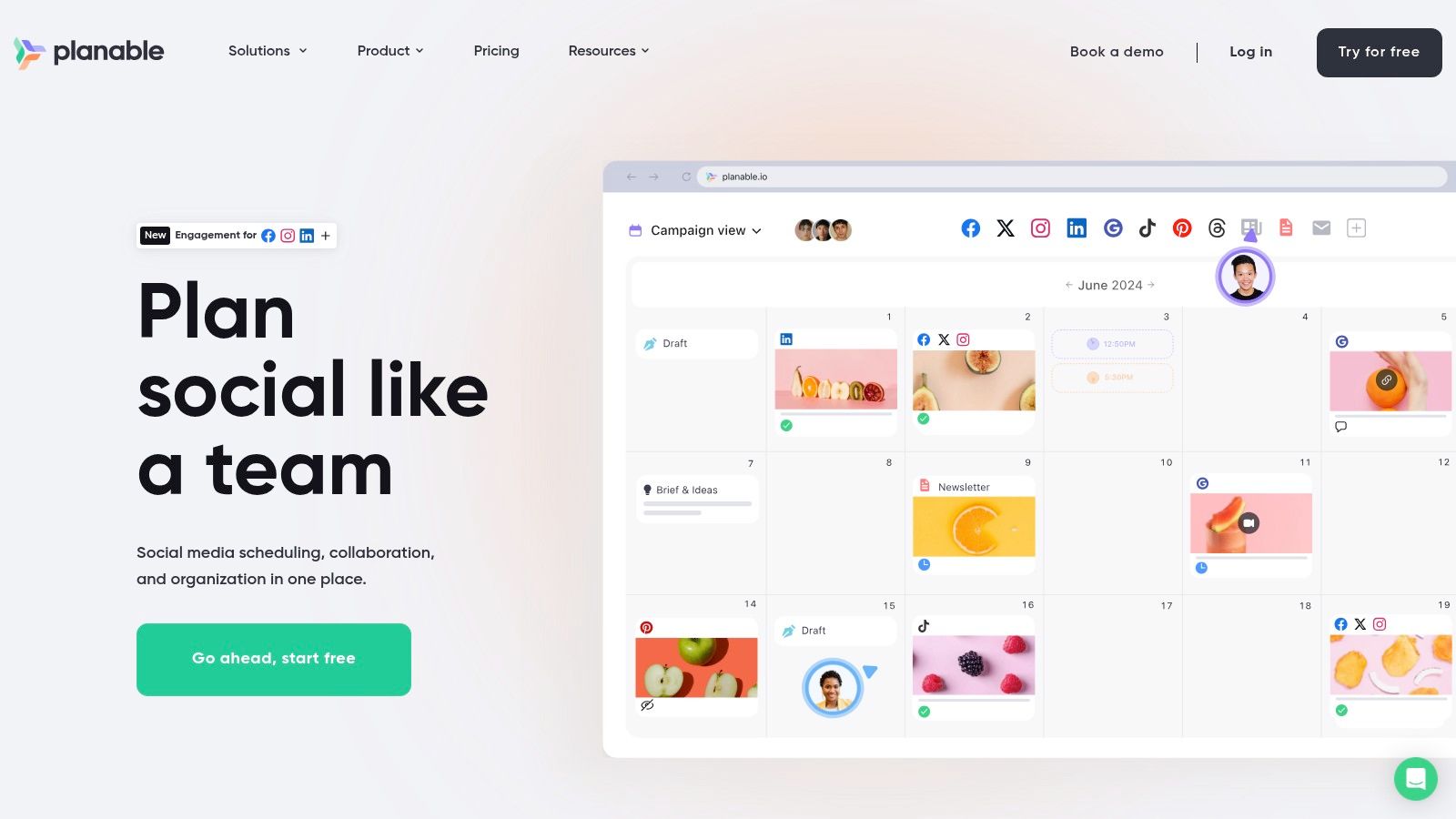
This "what you see is what you get" editor is a game-changer for maintaining brand consistency and client satisfaction. A social media manager can draft a post for Instagram, complete with the caption and visuals, and the client can leave comments directly on the preview. This removes the friction and endless email chains that often plague content approval, making the entire workflow more efficient and transparent for everyone involved.
Key Features & Use Cases
- Universal Content Workspace: Plan, create, and refine content for multiple platforms like Facebook, Instagram (including Stories and Reels), Twitter, LinkedIn, and TikTok in one centralized hub.
- Pixel-Perfect Previews: Show stakeholders exactly how content will look when it goes live, ensuring brand alignment and reducing requests for revisions.
- Layered Approval Workflows: Set up multi-level approval systems (e.g., internal review first, then client approval), which is critical for agencies managing multiple accounts.
- Real-Time Collaboration: Team members and clients can leave contextual comments and feedback directly on posts, keeping all communication organized and in one place.
Pros & Cons
| Pros | Cons |
|---|---|
| Drastically Simplifies Approval: Visual previews and direct feedback tools streamline client and team reviews. | Limited Integrations: Lacks the extensive third-party app integrations found in larger marketing suites. |
| Intuitive User Interface: The platform is extremely easy to navigate, requiring minimal team onboarding. | Pricing Can Be High: The cost may be a barrier for solo creators or very small teams with tight budgets. |
| Enhances Team Communication: Centralizes all content-related discussions, eliminating scattered feedback. |
Pricing
Planable offers a free plan to get started, which includes 50 total posts. Paid plans are available on a per-user, per-workspace basis, starting with the Basic plan and scaling up to Pro and Enterprise tiers for larger teams and agencies needing more advanced features.
Website: planable.io
12. Descript
Descript revolutionizes audio and video production by transforming it into a process as simple as editing a text document, securing its place among the best tools for content creation. It is an indispensable asset for podcasters, video creators, and marketers who want to streamline their workflow. The platform’s core innovation is text-based editing; it automatically transcribes your media, allowing you to edit the video or audio by simply deleting or rearranging words in the transcript. This intuitive approach removes the technical barriers of traditional timeline-based editors.
The real power of Descript lies in features like "Studio Sound," which can make amateur recordings sound professionally produced with a single click, and "Overdub," which lets you correct audio mistakes by typing the right word. For instance, a podcast host can fix a misspoken phrase without re-recording the entire segment, saving immense time. Similarly, a marketing team can quickly create multiple versions of a video ad by editing the transcript, a task that would be far more complex in traditional software.
Key Features & Use Cases
- Text-Based Editing: Edit video and audio by manipulating the transcript. Ideal for interview-based content, podcasts, and educational videos where dialogue is central.
- Automatic Transcription: Provides highly accurate transcriptions that serve as the foundation for editing, making content more accessible and repurposable for blog posts or show notes.
- Studio Sound & Overdub: Enhance audio quality to a professional level and create realistic AI voice clones to correct errors. A game-changer for creators without access to a professional studio.
- Screen Recording: An all-in-one tool for creating tutorials, product demos, or team communications. You can record, edit, and share directly from the platform.
Pros & Cons
| Pros | Cons |
|---|---|
| Intuitive Word-Based Editing: Radically simplifies the editing process, making it accessible to non-editors. | Learning Curve for Traditional Editors: The workflow can feel counterintuitive for those accustomed to timeline-based software. |
| Powerful AI Features: Studio Sound and Overdub save significant time in post-production and cleanup. | Subscription for Key Features: Most powerful tools, including Overdub and filler word removal, are behind a paywall. |
| All-in-One Platform: Combines recording, transcription, and multi-track editing, reducing the need for multiple tools. |
Pricing
Descript offers a free plan with limited transcription hours and features. Paid plans unlock more transcription time, advanced features like Overdub and Studio Sound, and collaborative tools for teams.
Website: descript.com
Key Features Comparison of 12 Content Creation Tools
| Platform | Core Features/Characteristics | User Experience/Quality ★ | Value Proposition 💰 | Target Audience 👥 | Unique Selling Points ✨ |
|---|---|---|---|---|---|
| 🏆 ai-media-studio | 50+ AI art styles, text-to-image/video, advanced editing tools | ★★★★☆ - Simple, fast, professional | Free tier + scalable subscriptions | Creators, marketers, professionals | No design skills needed, privacy focused, collaboration tools |
| Canva | Drag-and-drop editor, templates, brand kit | ★★★★☆ - Intuitive for all skill levels | Free + affordable paid plans | Beginners to professionals | Huge template library, easy collaboration |
| Adobe Premiere Pro | Advanced video editing, color/audio correction, Creative Cloud | ★★★★★ - Industry standard | Subscription-based, premium pricing | Filmmakers, content creators | Professional-grade video production |
| Grammarly | Grammar checks, style suggestions, plagiarism detection | ★★★★☆ - Real-time writing aid | Free + premium subscription | Writers, professionals, students | Multi-platform support, real-time feedback |
| Hootsuite | Social media scheduling, analytics, monitoring | ★★★★☆ - Comprehensive but complex | Tiered subscriptions, can be pricey | Social media managers, marketing teams | Multi-platform support, strong analytics |
| Notion | Note-taking, project management, customizable workflows | ★★★★☆ - Flexible, customizable | Free + paid upgrades | Teams, project managers, content planners | All-in-one workspace, rich media support |
| Lumen5 | AI text-to-video, templates, stock media | ★★★☆☆ - Easy video creation | Free + subscription for advanced | Marketers, content creators | AI-driven video from text |
| CapCut | Video editing app, effects, auto-captioning | ★★★★☆ - Free, user-friendly | Completely free | Beginner & intermediate editors | No watermark, TikTok integration |
| Surfer SEO | SEO content optimization, SERP analysis, keyword research | ★★★★☆ - Data-driven, user-friendly | Subscription-based, higher price | SEO pros, content marketers | Real-time SEO feedback, content audit |
| Jasper | AI content generation, tone/style customization | ★★★★☆ - Efficient, quality writing | Subscription-based | Marketers, writers | Multi-language, Surfer SEO integration |
| Planable | Content calendar, approval workflows, collaboration | ★★★★☆ - Streamlines team work | Subscription-based, can be pricey | Social media teams | Visual approval workflows |
| Descript | Audio/video editing, transcription, overdub | ★★★★☆ - Innovative text-based editing | Free + paid plans | Podcasters, video creators | Text-based editing, synthetic voiceover |
Building Your Ultimate Content Creation Stack
Navigating the vast landscape of software can be overwhelming, but as we've detailed, identifying the best tools for content creation is less about finding a single "magic bullet" and more about assembling a powerful, personalized technology stack. The goal is to create a seamless workflow where technology amplifies your creativity, rather than hindering it. From the comprehensive project management capabilities of Notion to the sophisticated video editing power of Adobe Premiere Pro, each tool serves a specific purpose in the content lifecycle.
The key takeaway from our deep dive is that the "best" tool is entirely subjective; it's the one that best fits your specific context. A solo blogger's ideal stack, perhaps centered around Canva, Grammarly, and Surfer SEO, will look vastly different from a corporate marketing team's toolkit, which might rely on Hootsuite, Jasper, and Descript for collaborative, high-volume production. This list is designed to be a strategic resource, not a shopping list. It empowers you to diagnose your own content creation bottlenecks and select solutions with surgical precision.
How to Choose Your Perfect Toolkit
Making the right choice requires a strategic approach. Before committing to a subscription, consider the following factors to ensure you're building a stack that works for you, not against you.
- Define Your Core Needs: Are you focused on video production, written content, or social media management? A video-first creator might prioritize CapCut or Lumen5, while a writer will find more value in Grammarly and Surfer SEO. Clearly identify your primary content format to narrow your options.
- Evaluate Your Team Size and Workflow: A freelancer needs tools that are cost-effective and easy to manage alone. A larger team, however, should prioritize tools with strong collaborative features, such as the review and approval workflows in Planable or the shared databases in Notion.
- Consider Scalability and Integration: Think about your future needs. Will this tool grow with you? More importantly, does it integrate well with the other software you already use? A well-integrated stack, where tools like Jasper and Surfer SEO work together, saves significant time and reduces manual effort.
- Assess Budget and ROI: Don't just look at the price tag; consider the return on investment. If a premium tool like Adobe Premiere Pro saves your team hours of editing time each week, its cost is easily justified. Utilize free trials to test a tool's impact on your efficiency before you buy.
Your Actionable Next Steps
Building your ultimate content creation stack is an ongoing process of refinement. Start by auditing your current workflow. Identify the most time-consuming or frustrating tasks, from generating initial ideas to scheduling final posts. Use that analysis to pinpoint the specific gaps in your existing toolkit.
From there, select one or two tools from this list that directly address those pain points and commit to their free trial periods. This hands-on evaluation is the most effective way to determine if a tool truly fits your process. By strategically investing in the right technology, you’re not just acquiring software; you are investing in your capacity to produce higher-quality content more efficiently, freeing you up to focus on what truly matters: creativity and strategy.
Ready to supercharge your visual content creation with the power of AI? For those looking to generate stunning, high-quality images and videos without the steep learning curve of traditional software, AI Media Studio offers an intuitive and powerful solution. Explore how you can create professional-grade visuals in minutes by visiting ai-media-studio today.